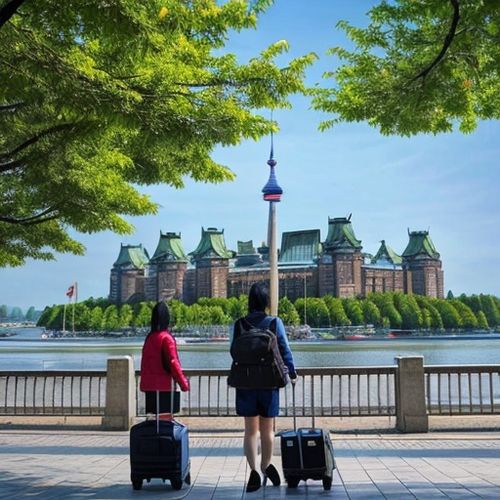Canada has recently announced a significant easing of visa restrictions for Chinese tourists, marking a pivotal shift in its travel policies. The new measures include granting 10-year multiple-entry visas, a move expected to bolster tourism and strengthen bilateral ties between the two nations. This decision comes as part of Canada's broader strategy to attract more visitors from China, one of the world's largest outbound travel markets.
The updated visa policy allows Chinese nationals to enter Canada multiple times over a decade, with each stay lasting up to six months. This is a substantial improvement over previous regulations, which often required travelers to reapply for visas more frequently. The change reflects Canada's recognition of the growing economic and cultural contributions of Chinese tourists, who are known for their high spending power and interest in long-haul destinations.
Industry experts have welcomed the move, predicting a surge in Chinese visitors to Canada in the coming years. The country's diverse attractions—from the stunning landscapes of Banff National Park to the vibrant multicultural cities like Toronto and Vancouver—are expected to appeal to a wide range of Chinese travelers. Additionally, the ease of travel could encourage repeat visits, as families and business travelers take advantage of the extended visa validity.
Economic implications are at the forefront of this policy shift. Chinese tourists are among the top spenders globally, and Canada aims to capture a larger share of this lucrative market. Local businesses, particularly in the hospitality and retail sectors, are likely to benefit from increased tourist spending. Hotels, restaurants, and tour operators are already preparing for an influx of visitors, with some offering Mandarin-speaking services and tailored experiences to cater to Chinese preferences.
The decision also underscores the importance of China as a key partner for Canada. Over the past decade, the two countries have deepened their economic and diplomatic relations, with tourism playing a vital role in fostering mutual understanding. By simplifying the visa process, Canada sends a clear message of openness and hospitality, which could pave the way for further collaboration in trade, education, and cultural exchanges.
However, the policy change is not without its challenges. Some critics have raised concerns about potential strains on Canada's immigration and border control systems. Ensuring a smooth and efficient entry process for the expected increase in visitors will be crucial. Authorities have assured that additional resources will be allocated to manage the higher volume of applications and arrivals, maintaining security while facilitating travel.
For Chinese travelers, the new visa rules represent a major convenience. Many have expressed enthusiasm about the opportunity to explore Canada more freely, without the hassle of frequent visa renewals. Social media platforms in China have been abuzz with discussions about potential itineraries, with popular destinations like Niagara Falls and the Canadian Rockies topping the list.
Long-term benefits of the policy extend beyond tourism. Strengthening people-to-people connections can lead to greater cultural exchange and mutual appreciation. Students, entrepreneurs, and professionals from China may also find it easier to engage with Canada, whether for short-term visits or longer-term opportunities. This aligns with Canada's broader goals of attracting global talent and fostering international ties.
As the world emerges from the pandemic, Canada's proactive approach to welcoming Chinese tourists sets a positive example for other nations. The 10-year multiple-entry visa is a bold step that acknowledges the value of Chinese travelers and their potential to contribute to Canada's economy and society. While the full impact of the policy will unfold over time, the initial response suggests a bright future for Canada-China travel relations.
In conclusion, Canada's decision to relax visa requirements for Chinese tourists is a win-win for both countries. It not only enhances travel convenience but also opens doors for deeper economic and cultural engagement. As more Chinese visitors discover the beauty and opportunities Canada has to offer, the bonds between the two nations are poised to grow stronger than ever.

By John Smith/Apr 11, 2025

By Samuel Cooper/Apr 11, 2025

By George Bailey/Apr 11, 2025

By Thomas Roberts/Apr 11, 2025

By Lily Simpson/Apr 11, 2025

By Jessica Lee/Apr 11, 2025

By Laura Wilson/Apr 11, 2025

By Olivia Reed/Apr 11, 2025

By Noah Bell/Apr 11, 2025

By Christopher Harris/Apr 11, 2025

By Emma Thompson/Apr 11, 2025

By Ryan Martin/Apr 11, 2025

By Grace Cox/Apr 11, 2025

By Sarah Davis/Apr 11, 2025

By James Moore/Apr 11, 2025

By Emma Thompson/Apr 11, 2025

By James Moore/Apr 11, 2025

By Victoria Gonzalez/Apr 11, 2025

By Michael Brown/Apr 11, 2025

By Grace Cox/Apr 11, 2025